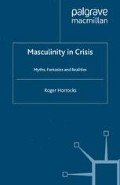Abstract
Up to now, I have argued that boys are impelled towards some kind of masculine identity by great social and psychological forces. Many cultures demand it as an economic necessity: males are needed for hunting, war, the propagation of children, the protection of the tribe and the family. Thus there is a strong pressure on boys to separate from their mother, to break the ‘proto-feminine’ identity they have initially formed. Patriarchal society requires its infantry and its officers, who will regulate the exploitations essential to its survival, and in particular will keep women oppressed.
Access this chapter
Tax calculation will be finalised at checkout
Purchases are for personal use only
Preview
Unable to display preview. Download preview PDF.
Notes
Ernest Hemingway, Death in the Afternoon (Harmondsworth: Penguin, 1966) p. 23.
Ernest Hemingway, The Garden of Eden (London: Grafton, 1988) p. 25.
Kenneth S. Lynn, Hemingway (London: Sphere, 1989) p. 110.
Bernice Kert, The Hemingway Women (London: W. W. Norton, 1986) p. 231.
Letter to Maxwell Perkins, 26 July 1933, in Carlos Baker (ed.), Ernest Hemingway: Selected Letters 1917–1961 (London: Panther, 1985) pp. 395–6.
M. Pickering and K. Robins, ‘The Making of a Working Class Writer: An Interview with Sid Chaplin’, in J. Hawthorn (ed.), The British Working Class Novel in the Twentieth Century (London: Edward Arnold, 1984) p. 143.
Jane Austen, Emma (Harmondsworth: Penguin, 1984) p. 232.
See Camille Paglia, Sexual Personae: Art and Decadence from Nefertiti to Emily Dickinson (Harmondsworth: Penguin, 1991) Chapter. 17: ‘Romantic Shadows: Emily Brontë’.
Rob Weatherill, ‘The Psychical Realities of Modern Culture’, British Journal of Psychotherapy, 7:3 (1991) p. 273.
Juliet Mitchell, ‘The Question of Femininity and the Theory of Psychoanalysis’, in G. Kohon (ed.), The British School of Psychoanalysis: The Independent Tradition (London: Free Association Books, 1986) p. 394.
Editor information
Copyright information
© 1994 Roger Horrocks
About this chapter
Cite this chapter
Horrocks, R. (1994). The Fragile Male. In: Campling, J. (eds) Masculinity in Crisis. Palgrave Macmillan, London. https://doi.org/10.1057/9780230372801_6
Download citation
DOI: https://doi.org/10.1057/9780230372801_6
Publisher Name: Palgrave Macmillan, London
Print ISBN: 978-0-333-59323-3
Online ISBN: 978-0-230-37280-1
eBook Packages: Palgrave Social & Cultural Studies CollectionSocial Sciences (R0)

